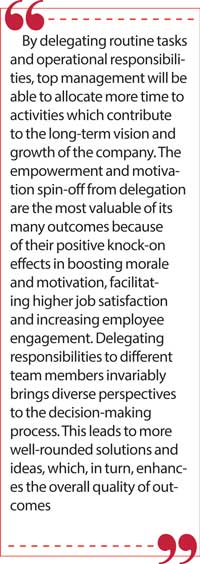Friday Feb 27, 2026
Friday Feb 27, 2026
Wednesday, 27 December 2023 00:26 - - {{hitsCtrl.values.hits}}

A reluctance to delegate is a form of self-destruction in your journey to being an effective leader
 In my short career as a Leadership Coach since retiring from John Keells Holdings PLC (JKH) in December 2017, I have coached, and mentored, 89 “C” suite executives and based on my observations, I would state, unhesitatingly, that the acute reluctance of leaders to delegate is the foremost factor impeding their leadership development. This reluctance emanates, mainly, from the “coachees’” internalised beliefs and misconceptions. Albeit to a much lesser extent, the culture of the organisation which he or she belongs to, and the culture and traditions of Sri Lanka where centralised decision making is the norm, have also played their part in fertilising this reluctance.
In my short career as a Leadership Coach since retiring from John Keells Holdings PLC (JKH) in December 2017, I have coached, and mentored, 89 “C” suite executives and based on my observations, I would state, unhesitatingly, that the acute reluctance of leaders to delegate is the foremost factor impeding their leadership development. This reluctance emanates, mainly, from the “coachees’” internalised beliefs and misconceptions. Albeit to a much lesser extent, the culture of the organisation which he or she belongs to, and the culture and traditions of Sri Lanka where centralised decision making is the norm, have also played their part in fertilising this reluctance.
Paradoxical, as it may sound, many are the instances where the head of a “coachee’s” organisation has told me, at feedback time, that the subject “coachee”, who is already at a very senior level and is being groomed to take over as the Chairman, Managing Director, or Chief Executive Officer, is not involved enough in routine day-to-day operations. They often complain that he/she is too hands-off. Whilst I acknowledge that there is a fine line between “hands-off” and “hands-on” leadership, the proportion of time spent on each is a function of the hierarchy level and need.
Notwithstanding the ‘pros’ and ‘cons’ and/or the ‘ifs’ and ‘buts’, the skill of delegation is a key weapon in the armoury of a person climbing the corporate ladder to positions which demand more mind space in strategic thinking as opposed to operational thinking which, as many studies show, is more productively delivered, and implemented, at lower levels by staff who are trained and competent to do so.
While the benefits of delegation are well accepted by most “coachees” at our one-on-one discussions, they fail to practice it wholeheartedly at their workplaces because of misconceptions and fears. The most prevalent of such fears is where leaders believe that they must have full knowledge, and be in control, of all decisions made on matters which fall under their purview. In this context, the reluctance to delegate tasks is understandable because the subject leader/manager may still be retaining overall accountability, an aspect which he would wish to protect, and portray positively, in avoiding reputational damage, injury to his ego and pride and, negative impacts on his performance-based remuneration and promotional prospects.
It was United States Senator, Byron Dorgan who remarked, “You can delegate authority, but you cannot delegate responsibility.” In much contrast to the Senator’s observation, I am more in favour of delegating the responsibility too. I believe there must be a full carve out. While there is no denying that a decision to delegate carries with it competing risks and rewards, anecdotal evidence is overwhelming in confirming that the rewards of carefully structured and well executed delegation far exceed the risks. In my early days at Anglo American Corporation (Anglo), my bosses regularly reminded me, particularly at performance feedback time, that my upward career movement within the Group depended on how well I developed subordinates to take over my role. I concluded that on-job training, enabled by delegation and catalysed by empowerment, was the quickest way to stardom. Therefore, I gradually increased the authority of identified subordinates by entrusting them with decisions which I deemed were within their competence. Proactive training and development, coaching and mentoring, close guidance and counselling were all a part of the theatre.
For starters, I passed on to them the lower hanging low impact decisions. As my trust in their abilities grew, I began to load them with higher hanging high impact decisions. My approach was obviously effective when viewed against a scorecard of seven promotions in a career spanning 25 years – from Chief Accountant of a medium sized Anglo subsidiary to the Finance Director of the Group and finally the Managing Director of Anglo-American Corporation (Central Africa) Ltd. Delegation while proving to being a valuable empowering tool, was my passport to more challenging roles at the apex of the organisation. It is an observed phenomenon that many leaders are scared, and therefore hesitant, in allowing others to make key decisions because they are nervous that the delegatee will choose an option that they have not pre-discussed or have not pre-agreed. Thankfully, I did not harbour such anxieties and proceeded with full trust in the abilities of my subordinates and team.
I have come across many leaders who wish to be in total control of all parts of decision making as is relevant to them. They refuse to let go. This may not work as the organisational size and complexity increase. In my careers at both Anglo and JKH, I was very cognisant that trust was essential in making delegation effective. The constant progress checking of a delegatee is not a value-adding approach and will inevitably be seen by the delegatee as micro-management. Delegation, characterised by trust and empowerment, boosts motivation and innovation, while micro-management, although sometimes necessary, leads to stress and stifles creativity.
The occasional reluctance of persons to accept a delegated task is often created by a lack of commensurate authority and by what the delegatees see as the delegators’ lack of trust in their ability. This is easily redressable by giving delegatees the freedom and flexibility to choose how they will complete the tasks in keeping with quality and time expectations. By respecting their opinions and ideas and by encouraging their suggestions and feedback, leaders can entrench a deep sense of belonging in their followers. This, as we know, is the holy grail of employee connection.
 A reluctance to delegate also stems from leaders’ anxiety that delegation may result in deadlines, and the requisite quality levels, not being met. They fear that delegatees would not be able to make decisions consistent with the overall strategy of the company because they are not overly familiar with the company’s strategy because of limited involvement in its formulation. This concern can be allayed by employing a combination of bottom-up and top-down approaches to strategy formulation and by clearly communicating the finalised strategy to all the affected persons. A shared vision and a shared understanding, while being invaluable bases in effective delegation, augment the ability of subordinates to make decisions which are consistent with the company’s culture and the overall strategy.
A reluctance to delegate also stems from leaders’ anxiety that delegation may result in deadlines, and the requisite quality levels, not being met. They fear that delegatees would not be able to make decisions consistent with the overall strategy of the company because they are not overly familiar with the company’s strategy because of limited involvement in its formulation. This concern can be allayed by employing a combination of bottom-up and top-down approaches to strategy formulation and by clearly communicating the finalised strategy to all the affected persons. A shared vision and a shared understanding, while being invaluable bases in effective delegation, augment the ability of subordinates to make decisions which are consistent with the company’s culture and the overall strategy.
When individuals are given the opportunity of stepping outside of their typical day-to-day activities and take on new tasks or get involved in decision-making, they become more invested in the outcome of their delegated responsibilities. The bottom line is that the fear of failure must never be a justification for not delegating.
Letting go of power can be challenging. But, accepting that you cannot do everything yourself is important. My team’s success is my success. In keeping with the same, I have rarely left any stone unturned in empowering my team and my subordinates and, where applicable, in winning the confidence of my peers and superiors too. I love the Kouzes and Posner statement in their best seller, “The Leadership Challenge” which reads: ‘One becomes powerful by becoming powerless.’ Delegation is, undoubtedly, the path towards that. I am acutely aware that as much as I wish to succeed in what I do, my team, too, wants to succeed in what it does. In my 52-year corporate career, I can humbly say that I have never been let down by any team which I was, or which I am, a part of. I have found that people will seldom let you down if they understand that your destiny is in their hands.
It is a leaders’ common moan that it takes them longer to teach someone than just do it themselves. While this may hold true, initially, leaders who take the plunge, nevertheless, soon realise that within an incredibly short period, the amount of personal time which they must dedicate to the subject tasks reduces dramatically, thereby, allowing them to use the freed time in more strategic matters which call for their competence and expertise. Then, there are the guilt-stricken leaders who identify delegating as ‘passing the buck.’ So, they avoid it and end up wasting their time as well as the company’s time and resources on work which was productively doable at lower levels.
Psychologists explain leaders’ reluctance to use empowerment tools such as delegation to their faith in the ‘supervision effect’ and ‘self-enhancement effect.’ In the ‘supervision effect,’ it is believed that work done under supervision is better than identical work done without supervision, and in the ‘self-enhancement effect’ a person tends to consider work done by him as superior in quality to work done by others. By understanding why leaders are reluctant to delegate tasks and why staff members may be reluctant to accept them, we can be more effective delegators.
Terms such as ‘leading from the front’ and ‘being hands on’ may convey a view that effective leadership is all about taking charge and making all the decisions. This, certainly, is not the case. Effective leaders are those who are quick to recognise their limitations and harness the collective strengths and expertise of their teams. It is common knowledge and a proven fact that the skill of delegation is a key factor in separating great leaders from good leaders. Delegation is not just a matter of transferring authority and responsibility. It is a strategic tool of empowerment which leads to natural collaboration, increased productivity, and greater success.
As was mentioned earlier, achieving the right balance between the strategic and the tactical is important for any leader to be effective, considering the myriad of demands on their time and attention. By delegating routine tasks and operational responsibilities, top management will be able to allocate more time to activities which contribute to the long-term vision and growth of the company. The empowerment and motivation spin-off from delegation are the most valuable of its many outcomes because of their positive knock-on effects in boosting morale and motivation, facilitating higher job satisfaction and increasing employee engagement.
Delegating responsibilities to different team members invariably brings diverse perspectives to the decision-making process. This leads to more well-rounded solutions and ideas, which, in turn, enhances the overall quality of outcomes. Additionally, the institutionalising of a culture of delegation enables scalable structures which have the capacity to manage increased workloads without overburdening the top leadership. Delegation, while being a mechanism for on-the-job skills development, also accelerates a delegatee’s professional growth and contributes to building a pool of competent leaders. Delegation is a great ally in avoiding burn-out of top executives through a balanced distribution of workloads. Overall, effective delegation is a sign of strong leadership. It evidences that you can identify talent, clearly signal intent, set expectations, and provide guidance, all of which are essential leadership skills.
I recollect an incident in 1995 which led to a sea-change in my attitude to work while on holiday or on leave. I was, at that time, the Finance Director of the Anglo Group in Zambia. My wife and I had just returned from a great four-week holiday in the United Kingdom (UK). The quarterly Board Meeting was held in Lusaka, Zambia about ten days after I had returned. Directors based in the UK and South Africa flew into Zambia for the meeting. One of them remarked that I looked very relaxed. I said that it should be the case given my fun-filled four weeks in the UK. However, I did mention to him that I carried the office in my head and that I was checking with the Lusaka Office at least three times every day, i.e., early morning, afternoon, and late evening.
The subject director commented that allowing office work to disturb my holiday was not appropriate and after listening to my description of events, he asked me to meet with the counsellor at the Anglo Head Office in Johannesburg when I next visited South Africa. That I did.
Thirty minutes into the meeting, she said that the “office in my head” syndrome was due to a lack of delegation on my part. She asked me to list out the following: * All my tasks, both big and small. If I remember there were 311 different items, * She, then, asked me to categorise the 311 items into – Tasks which I could delegate immediately, Tasks which I could delegate within 3 months after arranging training and guidance, Tasks which I could delegate within six months, after arranging training and guidance, and – Tasks which I had to retain for sole execution. The number of tasks I retained was approximately 70.
As history records, I delegated all the other tasks within six months. It was a big load off my shoulders. My delivery levels improved significantly and my involvement in strategy became routine. From that day onwards, I never carried the “office in my head” when I was on leave or on holiday. Other than in a few exceptional instances, I never experienced a need to call my office. My peers, subordinates and team managed the various issues adroitly. I had told them to make decisions (other than those of a critical nature) with confidence and that I would back their decisions a hundred percent if the intent was in the best interest of the company and was transparent. This was a style I adopted at JKH, too. I had great gals and guys collaborating with me at JKH and our trust in each other was mutual.
While the act of delegation may look elementary, and sound simple, there are a few basic rules which one must follow in ensuring the anticipated results. They are, > choose the right person for the task. It was Theodore Roosevelt, the 26th President of the United States of America who said, “The best executive is the one who has sense enough to pick good men to do what he wants done, and self-restraint to keep from meddling while they do it.”, > ensure that he/she has the competence, capability and the capacity to successfully complete the task, > explain to the delegatee the rationale behind the move, > provide clear and right instructions, > provide resources and training, > delegate authority and responsibility, > provide regular feedback, > convey affirmation. Affirmation is an unbelievably valuable signal. Positive affirmations disrupt negative thinking habits and build new routes in one’s brain for positive thoughts, and >appreciate, and commend, the delegatee’s efforts. Celebrate from the heart.
I closely relate my own experience in delegation to that of Richard Branson, British Business Magnate and Founder of the Virgin Group, who summated his views on delegation by stating: “From a young age, I learned to focus on the things I was good at and delegate to others what I was not good at. That is how Virgin is run. Fantastic people throughout the Virgin Group run our businesses, allowing me to think creatively and strategically.”
There is more than enough facts and findings in confirming that a non-delegation of responsibilities will lead to a loss of efficiency, time, and good relationships with your team members. A reluctance to delegate is a form of self-destruction in your journey to being an effective leader. Get rid of that reluctance, today.
(The writer is currently a Leadership Coach, Mentor and Consultant, and boasts over 50 years of experience in very senior positions in the corporate world – local and overseas. www.ronniepeiris.com.)